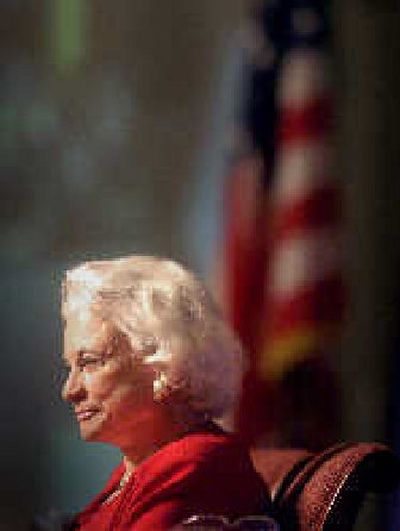Justice says independent courts at risk

Relations between Congress and the federal courts are as strained as they’ve been in her lifetime, a trend that’s both sad and worrisome, retiring U.S. Supreme Court Justice Sanda Day O’Connor said Thursday.
“The present climate is such that I worry about the future of the federal judiciary,” O’Connor told a gathering of judges and lawyers at the 9th U.S. Circuit Court conference. “In our country today, we’re seeing efforts to prevent an independent judiciary.”
O’Connor, who announced her retirement this month at the end of the Supreme Court’s session, held an “informal chat” on the high court and some of her decisions, in front of a packed room in the convention center. She defended court decisions that uphold the separation of church and state, and she commented on some of her dissenting views regarding majority decisions on medical marijuana, mandatory sentences and government agencies taking property away from private citizens.
In her lifetime, the 75-year-old O’Connor said, she has seen the respect for federal judges decline in Congress.
“In my younger days, we looked to federal judges to being the very best legal minds in the country,” she said.
Now Congress is talking about preventing federal courts from handling certain issues and complaining about judicial activism – “whatever that means,” she added. At a time when the United States is promoting “the rule of law” around the globe, Congress is trying to undercut one of the nation’s legal pillars.
“A key concept of the rule of law is the concept of an independent judiciary,” she said. Independent judges can protect individual rights and correct things that “get out of kilter” by other branches of government elected by majority rule.
The federal government is extending its authority into areas that traditionally was left to the states, O’Connor said. One example to her is medical use of marijuana, which voters in California approved but the federal government continues to prosecute.
A majority of the Supreme Court sided with the federal government, but “I didn’t think that was necessary,” she said. “I think we have some pretty good state governments around the country.”
O’Connor also dissented on a recent case that expanded local governments’ rights of eminent domain, and she drew laughs from the audience by immediately answering “no” to a question of whether that was a difficult dissent.
That ruling is a government license to transfer property from people with few resources to people with more resources, she said. “It’s an area where we’re going to see a number of states enact protection if they don’t already have it.”
A ruling that says sentences should be determined by juries, another of her dissents, was “an enormous step for the court to take” and will require the review of countless sentences, she said. It is also prompting Congress to draft bills on mandatory minimum sentences for certain crimes.
But O’Connor defended decisions that limit the display of certain religious icons as the balance between constitutional protections for an individual to freely exercise religion without the government establishing one. James Madison said religion “should be left to the conscience of every man,” she noted, and Americans exercise their religious rights by attending church more frequently than other developed nations.
“It’s hard to see why we should give this up in the face of the success we’ve had,” she added.
One of the biggest changes O’Connor has seen is the increase in women lawyers. When she graduated from law school in 1952, about 3 percent of the students were women; now more than 50 percent are.
When she applied for her first job, there were so few women lawyers that she couldn’t get an interview. She finally talked to the county attorney in San Mateo County, Calif., who said he’d like to hire her but he didn’t have the money, or a space for her to sit. She offered to work for free and share the office with a secretary. He took her up on the offer, and she didn’t get a paid position until the prosecutor was appointed to a judicial opening and opened up a slot.
The first woman appointed to the Supreme Court said she doesn’t deserve the credit for being in that ground-breaking position.
“Ronald Reagan enabled doors to be opened for women,” she said. “I never expected to be that person. I didn’t want to mess it up too badly.”